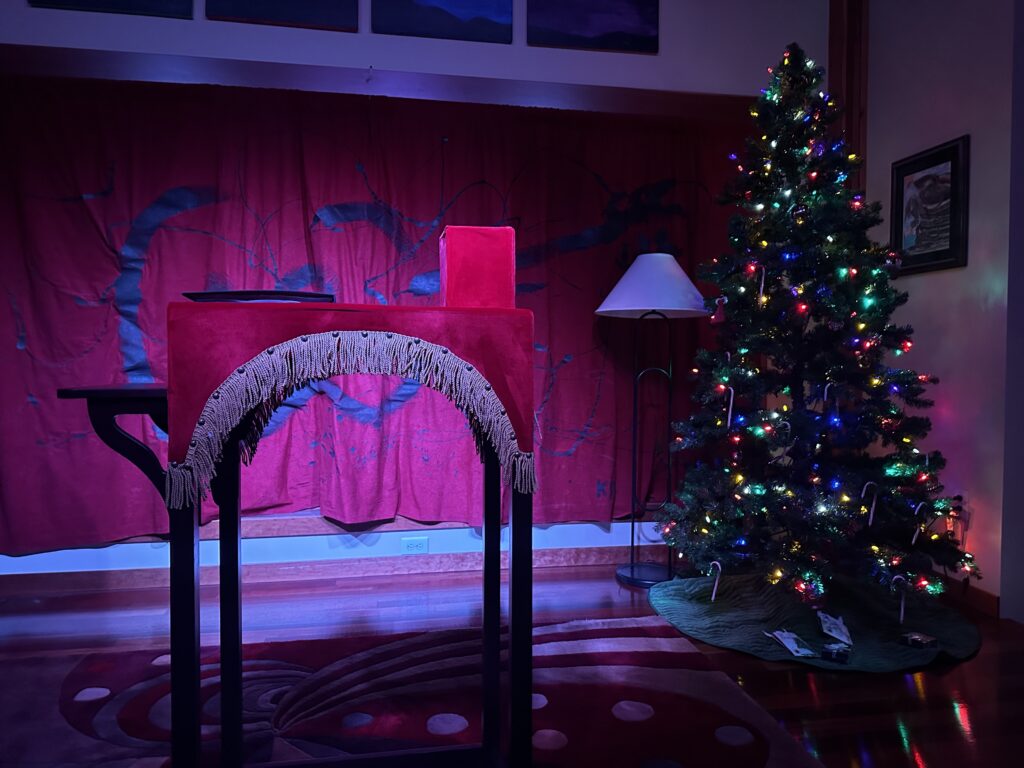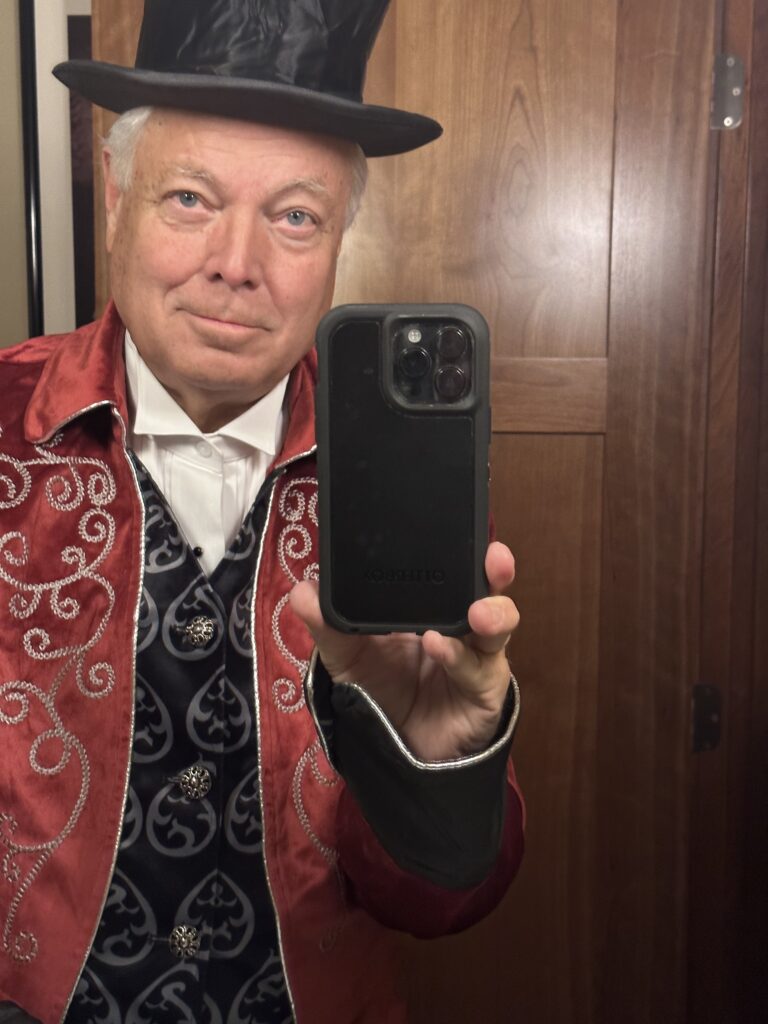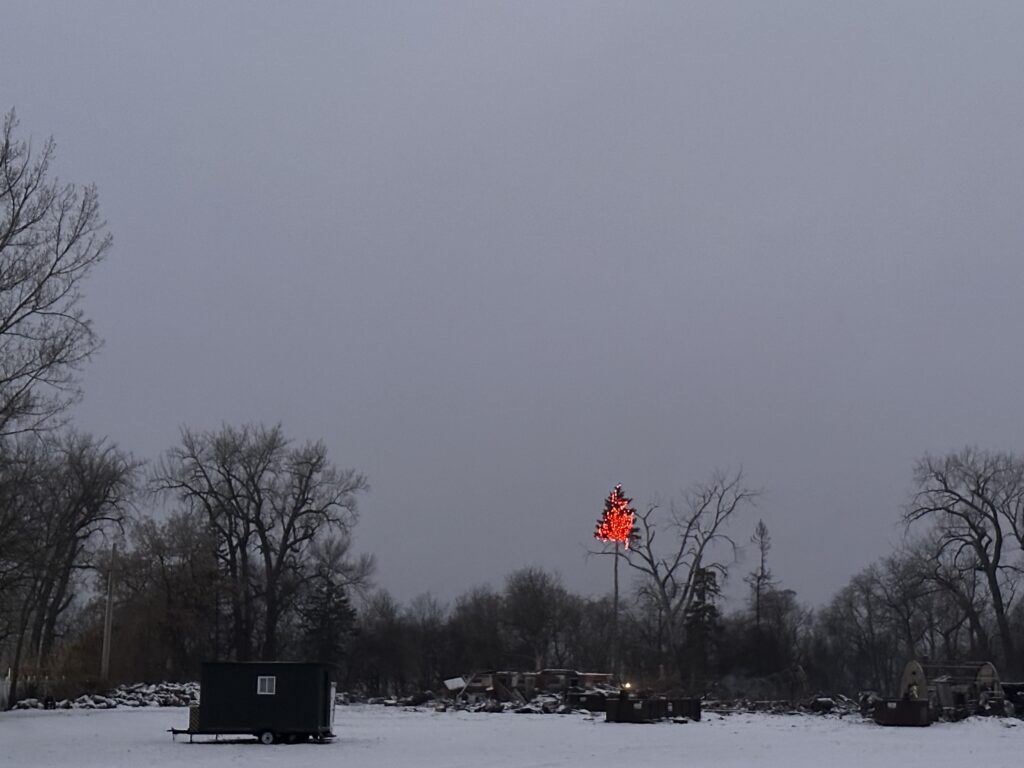
Thompson, North Dakota, Saturday, December 14 — Charles Dickens (1812-1870) is my favorite English novelist. I own four complete sets of his works (why?) and I re-read at least one of his 15 novels every year. A year or so ago, I made a Faustian bargain with my friend Kevin Muiderman, a master guitar maker, who lives about 20 miles from Grand Forks, North Dakota. If he would make me a replica of the special reading desk Dickens had built for himself when he took the voices of his novels onto the public stage beginning in the late 1850s, I’d come do a Dickens reading sometime at the modest performance theater in his home.
That sometime was last Saturday night.
He made the desk. Amy, his talented spouse, sewed the plush red Victorian coverlet that adorns the desk — plus a canvas traveling bag with the longest zipper I have ever seen. Having performed their side of the bargain so expertly, they now scheduled my Dickens performance.
There are several books about Dickens, the public reader. He had a significant theatrical flair. He extracted some of the public’s favorite passages from his novels, slightly reshaped them for public performance, and took to the road. His reading career was made possible by the advent of the railroad in Great Britain. I own two facsimile editions of his novels with his reading and marginal notes included.
Once when I was in Boston, I ventured into the Omni Parker House Hotel, where Dickens stayed during his visit to the United States in 1867-68, his second. He gave his celebrated readings next door at the Tremont Temple. He rehearsed endlessly. The iteration of the hotel he stayed in was later torn down, but when the hotel was rebuilt, the door of his suite (138-139) was saved and is now on display in the hotel along with other memorabilia. On the mezzanine you can see the 4 by 6 foot mirror he gazed into during his rehearsals, so that he could perfect every gesture, every smile, smirk, frown, grimace, and leer. The hotel sold tickets for a select few who could sit behind the great maestro and watch him rehearse.
I would have given anything to watch Charles Dickens read. His public performances were not like any author’s reading you have ever been to. Think of the most animated children’s storyteller during “reading hour,” coupled with one the greatest writers in the history of literature. Dickens was the hottest ticket in town. His readings immediately sold out. People queued up for hours, even days, before his performances. Hundreds of people were turned away. Women fainted when he read the story of Sikes killing his girlfriend Nancy in Oliver Twist or when he killed off Little Nell in The Old Curiosity Shop.
Dickens was effectively the Taylor Swift of his time. The difference is that Swift’s music will have been forgotten 100 years from now, but Dickens’ novels (plus the novella A Christmas Carol) will be read as long as English literature exists as a cultural form.
I chose five short passages from Dickens for my inaugural performance in Thompson, North Dakota: the “please, sir, I want some more” chapter from Oliver Twist, plus the death of Nancy. Nobody fainted, alas. The magnificent opening of Bleak House: “As much mud in the streets as if the waters had but newly retired from the face of the earth.” The famous opening of A Tale of Two Cities: “It was the best of times, it was the worst of times.” The uncanny and glorious chapter on jilted-and-frozen Miss Havisham in Great Expectations (my favorite Dickens novel, at least for now!). And — inevitably though I am something of a Scrooge about this novella — the opening and the close of A Christmas Carol.

Approximately 70 people drove out from Grand Forks, Fargo, Crookston, and points beyond to spend an evening with Charles Dickens. I had purchased a red Dickens reading costume, and I wore the top hat, but I did not pretend to be Dickens, merely to evoke a Dickensian atmosphere. Between readings I did commentary on the novels, on Dickens’ genius, on my own encounters with Dickens beginning in the first month of my four-year sojourn at Oxford University long ago, on Hallmark Channel Christmas movies, and on the Garrison, North Dakota, annual Dickens Festival, which I had to miss this year in order to … well, perform Dickens at the other end of the state.
Most folks came in casual dress, but several couples wore exquisite Norwegian holiday sweaters. A woman from England came up afterwards to congratulate me and to say, with a certain Dickensian edge, that she was glad I did not attempt a Cockney accent! A boy of 13 or so wore a Dickens urchin costume, but he did not catch the reference when I called him the Artful Dodger. My oldest friend in the world, my Marley, Mike Jacobs was there. I’ve known him since 1972.
Amy Muiderman, a caterer, provided exquisite food. There was a very large bowl of homemade eggnog with plenty of brandy. Charles Dickens, as well as his greatest characters, including my favorite Mr. Micawber of David Copperfield, loved nothing more than a bowl of punch.
As I prepared to read from A Christmas Carol, Kevin played a lovely riff on Silent Night, my favorite Christmas carol, which I associate with my German grandfather Dick Straus. His music was perfect for the occasion.
So, I’ve got the desk. I’ve got the costume. I’ve got the script. And I’ve got the bug. I hope to do more Dickens performances around the country as a fundraiser for the arts or for public radio stations. At the end of the evening I asked for a show of hands of those who would go home and read some Dickens before Christmas. Half the hands went up — the fibbers! I hope they do read Dickens. I recommend either Great Expectations (his second shortest novel, and arguably his greatest) or David Copperfield (the perennial public favorite then and now).
There are also outstanding BBC Masterpiece Theater productions of the novels. My favorites are adaptations of Great Expectations, David Copperfield, and Bleak House. Watching them will undoubtedly drive you to the books. We do not read Dickens for the plot lines. We read Dickens for his strange and deeply compelling humor, for his exploration of the nether side of the human character, for his evocations of London in the first half of the 19th century, and for his unbelievable capacity to do unprecedented things with the English language.
Meanwhile, God bless us everyone!

